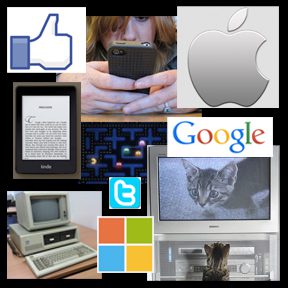Now we have a new challenge to our social order and general peace of mind: people talking to (not on, but to) their phones, their “virtual assistants,” if you will. This problem was highlighted in an article in the New York Times, “Virtual Assistants Raise New Issues of Phone Etiquette” by Nick Wingfield. Here’s is basic issue at hand:
The sound of someone gabbing on a cellphone is part of the soundtrack of daily life, and most of us have learned when to be quiet — no talking in “quiet cars” on trains, for example.
But the etiquette of talking to a phone — more precisely, to a “virtual assistant” like Apple’s Siri, in the new iPhone 4S — has not yet evolved. And eavesdroppers are becoming annoyed.
 The ability to give instructions to a PDA isn’t new. But, the iPhone 4S (which I do not own yet, by the way) is a game changer. It allows the user to communicate with Siri, a virtual assistant who can do all sorts of things, like set an alarm, send a dictated text message, or answer philosophical questions. (When my friend Dwight asked Siri, “What is the meaning of life?” he was told, simply, “Forty.”)
The ability to give instructions to a PDA isn’t new. But, the iPhone 4S (which I do not own yet, by the way) is a game changer. It allows the user to communicate with Siri, a virtual assistant who can do all sorts of things, like set an alarm, send a dictated text message, or answer philosophical questions. (When my friend Dwight asked Siri, “What is the meaning of life?” he was told, simply, “Forty.”)
In official and unofficial ways, our culture has been learning to deal with normal cell phone conversations in public. But talking to a virtual assistant on a phone gets into uncharted territory. As Wingfield notes:
Talking to your phone is so new that there are no official rules yet on, say, public transportation systems.
Cliff Cole, a spokesman for Amtrak, said the train line’s quiet-car policy applied to any use of voice with cellphones, though it explicitly bans only “phone calls,” not banter with a virtual assistant. “We may have to adjust the language if it becomes a problem,” Mr. Cole said.
There is a new moral and manners dimension to talking to your phone that is not present when you’re using a phone to talk with others:
Another irritant in listening to people talk to their phones is the awareness that most everything you can do with voice commands can also be done silently. Billy Brooks, 43, was standing in line at the service department of a car dealership in Los Angeles recently, when a woman broke the silence of the room by dictating a text message into her iPhone.
“You’re unnecessarily annoying others at that point by not just typing out your message,” said Mr. Brooks, a visual effects artist in the film industry, adding that the woman’s behavior was “just ridiculous and kind of sad.”
James E. Katz, director of the Center for Mobile Communication Studies at Rutgers, said people who use their voices to control their phones are creating an inconvenience for others — noise — rather than coping with an inconvenience for themselves — the discomfort of having to type slowly on a cramped cellphone keyboard. Mr. Katz compared the behavior with that of someone who leaves a car’s engine running while parked, creating noise and fumes for people surrounding them.
It will be interesting to see how all of this shakes out in the months and years to come. My guess is that there will soon be a whole new onslaught of rules, maybe even laws, that are meant to protect the innocents from the rude folk who would talk to their phones obtrusively. This may be necessary, I suppose. But don’t you wish people would simply think about the well-being of those around them before they act in an uncivil manner?
Of course this is part of the problem with living in a digital world. When I’m engrossed in my own electronic space, either fiddling away with an app on my phone, or checking my email, or updating my Facebook, I am not quite present in the physical world. I can easily imagine the day when I’ll be more attentive to Siri’s needs than to the needs of the real people around me.











